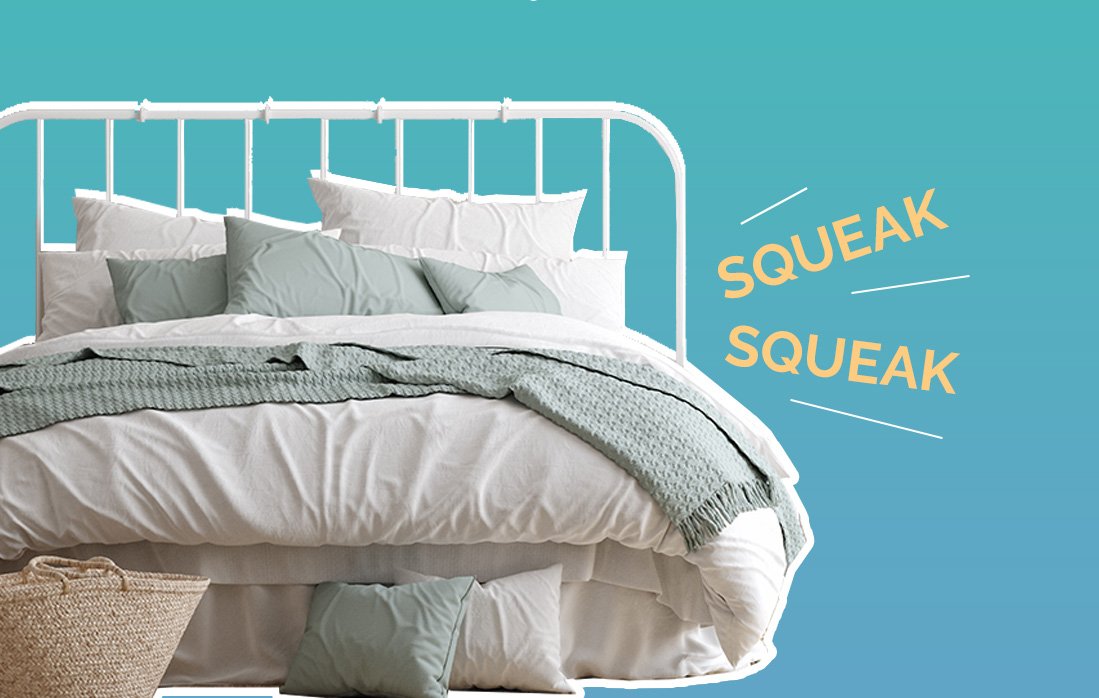
There’s nothing more annoying than climbing into bed after a long day just to hear your mattress squeak and shriek with your every movement. Creaky beds are noisy and uncomfortable, which can hurt your quality of sleep. If you’re dealing with a squeaky bed, however, there are many easy and low-cost solutions that may help you resolve your bed’s noise problem ASAP so you can get your best night’s sleep.
Keep reading to learn what causes these squeaks and creaks, and some tips on how to fix them.
How To Fix A Squeaky Bed
When you notice your bed is noisier than usual, these steps can help you troubleshoot and resolve the cause of your squeaky bed.
1. Find The Source
You’ll need to figure out where the noises are coming from before you can come up with a solution to your squeaky bed. Squeaking could be coming from the mattress, bed frame, or box spring. If you have an all-foam bed, it’s unlikely the mattress is causing your noisy nights. Any mattress that has innerspring coils, however, could be your culprit. To see if your mattress is making noise, take it off the foundation and put it directly on the ground. Sit or lay on it and bounce around to see if your movements cause noise.
If your mattress is quiet, you should put pressure on your box spring to see if it squeaks. If your mattress or box spring is squeaky, you’ll likely need to replace them — unless they are covered by warranties. If your mattress and box spring are quiet, your bed frame is likely to blame. Before you start shopping for a new one, you can try to fix up your bed frame to see if that solves the problem.
2. Tighten Joints
Your bed might be squeaking because the screws or bolts on your bed frame are too loose, causing the bed frame to move around and make unpleasant noises. Try tightening the joints around the corners of your bed frame. If tightening with a screwdriver or wrench doesn’t help, consider adding washers to the joints.
3. Lubricate Joints And Corners
Using WB-40, oil, or another lubricant to the screws, bolts, and corners of your bed frame may reduce the friction in the frame that causes squeaking and other noises. If you have a wooden bed frame, you can also try adding wax to the areas of your frame where pieces of wood touch one another to reduce friction.
4. Cushion The Bed Frame
Cushioning different areas of the bed frame may also help stop nighttime noises. If the squeaking is caused by the bed frame rubbing up against the mattress, you may be able to stop the noise by adding a thin cushion of fabric. Simply cover the bed frame with thin fabric or old t-shirts, washcloths, or socks and lay the mattress back on top of the frame. If the bed frame is uneven, you can add a cushion beneath the shorter legs to stop the frame from wobbling.
5. Add Felt Tape
If you have a wooden bed frame, the stringers, or pieces of wood that connect the headboard and footboard, can cause squeaking. The stringer has a wire hook on either side that can squeak as it rubs against the head and footboards. You can add felt tape to the areas of the head and footboard that touch the stringer to reduce noise.
6. Rotate The Bed
If you sleep in the same area of your innerspring mattress every night, your body weight will break down the mattress in that area faster and cause squeaking. Try rotating your bed to give the well-worn coils in your bed a break and see if that helps your squeaking situation.
7. Purchase A New Bed Frame
If you’ve tried all these steps and your bed frame keeps making a racket — it might be time to invest in a new bed frame. Choose one that is durable and higher quality to prevent your bed frame from breaking down and making noise in the future.
See: the best bed frames
8. Add A Mattress Topper
If the bed squeaking is caused by the coils on your bed, you may want to try adding a mattress topper to your bed. A mattress topper will create a buffer between your body and the bed to take pressure off the innerspring coils and keep creaking to a minimum. Additionally, this extra padding will muffle noise.
What Causes A Squeaky Bed?
The squeaking sounds that you hear coming from your bed are made by friction, or pieces of the mattress, box spring, or bed frame rubbing together as you move around on your bed. Mattresses made with innerspring coils can break down over time and start to creak. Likewise, older or lower quality box springs can also get noisy as the coils inside wear down and rub against each other.
Innerspring coils aren’t the only culprits for a squeaky bed. Your bed frame could also be making noise at night. When you sleep on your bed frame, the joints or pieces of the frame can get loose over time from the pressure of the mattress. This can cause noisy friction. Also, the bed can rub against the walls or the floor, which can be easily remedied with a little padding or moving the bed away from the wall.
When Does A Squeaky Bed Need To Be Replaced
If you’ve tried all the steps that we highlighted above to fix your squeaky bed situation and you’re still noticing noises when you sit or lay down on your mattress, it might be time to replace your mattress or foundation. Even the highest quality and top-rated mattresses will eventually break down over time — depending on the type of bed you have, you’ll need to replace it every five to 10 years. If you start noticing your bed getting noisier over time, that could be a sign that your mattress or box spring is ready for retirement and it’s time to start shopping for a new one.
FAQs
Do wood or metal frames squeak more?
While wood frames can squeak, metal frames are more likely to be noisy. A metal bed frame that is in good shape and put together properly won’t make any noise, but when metal frames begin to get loose over time from normal wear and tear, they can begin to squeak. This squeaking can usually be fixed by regularly tightening and lubricating the joints on the bed frame.
Are beds supposed to squeak?
A bed that is in good shape and put together properly is not supposed to squeak. When a mattress or box spring starts squeaking, it is a sign that the innerspring coils inside are wearing down and the level of support is compromised. If your bed frame is squeaking, it means it needs to be tuned up or replaced.
Can you stop a wooden bed from squeaking?
There are several ways to stop a wooden bed from squeaking. You can stop a bed from squeaking by preventing different parts of the bed from rubbing against each other by tightening the bed frame or adding a material like wax, felt tape, or padding to the parts of the bed that are touching and creating noise.
What causes a wooden bed to squeak?
A wooden bed squeaks when parts of the bed are loose enough that they rub together at the corner. The stringer, or the long piece that connects the headboard and the footboard in the center of the bed frame, is made with metal hooks that can also cause creaking.
How often should I replace my mattress?
Depending on the type of mattress you have, your mattress will likely need to be replaced every five to 10 years. You’ll know it’s time to start shopping for a new bed when your mattress starts to feel like it is lumpy or sagging, causes soreness when you wake up in the morning, or starts squeaking.
Conclusion
Your bed may be squeaking for several reasons: wear and tear, loose joints, or a shaky foundation. By following the steps we outlined above, you might be able to quickly and easily stop your bed from making noise. If you’ve exhausted all these steps and your bed is still squeaking and creaking, it might be time to replace your mattress or bed frame to make sure you can get your best night’s sleep. If you’re in need of a new mattress, check out our buying guide and our top picks for the best mattresses of the year to get started.



